The London School of Hygiene & Tropical Medicine debates health partnerships at Fiocruz
28/09/2023
Camila De'Carli (Fiocruz News Agency)
"What can we achieve together better than separately?". This was the question that opened the conference by Liam Smeeth, director of the London School of Hygiene & Tropical Medicine (LSHTM) at the Capes-Print Fiocruz International Seminar, held at the Center for Documentation and History of Health (CDHS) last Tuesday (9/19) with mediation by Cristiani Machado, vice-president of Education, Information and Communication, and Maurício Barreto, director of the Center for Data and Knowledge Integration for Health (Cidacs/Fiocruz Bahia). On his first visit to the Foundation's Manguinhos Campus, in Rio de Janeiro, the director of the English institution also visited the National School of Public Health (Ensp/Fiocruz) to discuss new partnerships and expand cooperation actions.
"We believe that we are trying to find a new path in partnerships and that they should be based on equity and trust", said Smeeth (photo: Camila De'Carli)
"What used to happen was that people, who probably looked a little like me, would travel to areas of the world, do their own studies, and then come back. This was how science and global health were done. We believe that we are trying to find a new path in partnerships and that they should be based on equity and trust," stated Smeeth.
For the British researcher, we must cooperate where there are "different skills, capabilities, resources and expertise" in order to overcome the challenges of global health that are imposed unequally around the world. Among these health challenges, he highlighted those brought about by climate change.
"As temperatures rise, more people die of heatstroke and heart attacks on very hot days. There are also indirect long-term effects, especially when you think about the ability to grow food, and there are already areas of the world that used to be very productive in terms of growing food, where now nothing grows," said Smeeth, remembering that the reduction in arable areas is worsened by a mostly urban population, which generates unequal impacts on nutrition. "There are around 800 million people in the world who don't have enough calories to eat every day, and 2 billion have measurable deficiencies in their diet. At the same time, 2 billion people are overweight or obese because they are consuming too many calories," he said.
Another manifestation of inequality mentioned by Smeeth was the change in disease patterns. "Non-communicable diseases now account for around three-quarters of deaths globally. But in low-income countries, most deaths are still due to communicable infections. These countries face a double threat because they are starting to suffer from these non-communicable diseases, but that doesn't mean that the infections are disappearing," he warned. Among them, malaria and neonatal diseases still appear as significant causes of mortality.
According to Smeeth, these are challenges that can be tackled with research. Through them, it is possible to identify and quantify diseases, point out who is most at risk and establish "what works and what doesn't". As an example, the researcher cited a study carried out in Mali and Burkina Faso that indicated the benefits of seasonal malaria chemoprophylaxis combined with vaccination to reduce the incidence of the disease in children.
Smeeth's seminar was part of a broader agenda for his first visit to Fiocruz. On Monday (9/18), the researcher was welcomed at the Moorish Castle by Cristiani Machado, Maria de Lourdes Oliveira, vice-president of Research and Biological Collections at Fiocruz, Maurício Barreto, and Researchers Gustavo Matta and Vinícius Cotta.
After the reception, Smeeth attended meetings at the Health History Documentation Center and the National School of Public Health, where possibilities for cooperation between Fiocruz and LSHTM were discussed, with emphasis on the areas of education and research into reproductive health, climate change, and vaccines, among others.


